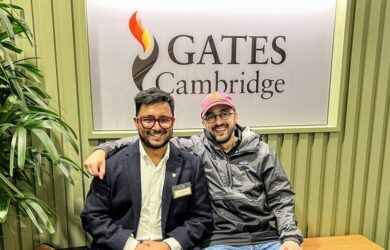Dr Anand Jeyasekharan's research uncovers the mechanism underlying the development of cancer in people with mutations in a ‘caretaker’ protein.
New research has uncovered the mechanism underlying the development of cancer in people with mutations in a ‘caretaker’ protein.
Gates Cambridge Alumnus Dr Anand Jeyasekharan’s research is published in the journal Nature Structural and Molecular Biology.
Dr Jeyasekharan’s research is linked to studies he did during his post-doctoral fellowship in Professor Ashok Venkitaraman’s laboratory at the Medical Research Council Cancer Unit at the University of Cambridge.
The tumour suppressor protein BRCA2 protects cells from becoming malignant by promoting an error-free form of DNA repair in the nucleus. Mutations in BRCA2 lead to the accumulation of DNA damage over decades, and thus to the development of cancer. Dr Jeyasekharan’s paper reveals the mechanism underlying the mislocalisation of BRCA2 that contains cancer-associated point mutations. The research provides insight into the cellular machinery involved in repair and maintenance of our genetic information, a process that is impaired in most epithelial cancers.
Dr Jeyasekharan [2004], who did a PhD in Oncology, is currently a Fellow in Medical Oncology at the National University Hospital, Singapore and a Principal Associate at the Cancer Science Institute. He said: “Mutations in the BRCA2 tumour suppressor result in defective DNA repair, but the mechanism by which this occurs is poorly understood. This paper describes the existence of hidden nuclear export signals within BRCA2 and its cargo protein RAD51, which are normally masked. We show that a subset of cancer-causing mutations cause an ‘unmasking’ of this signal, resulting in the export of the BRCA2 and RAD51 proteins into the cytoplasm, and thereby decreasing their availability for error-free DNA repair.”
His current work at the Cancer Science Institute aims to build on this discovery, testing for unique defects in protein localisation within tumour samples to refine the selection of patients for therapy targeting DNA repair in cancer.












